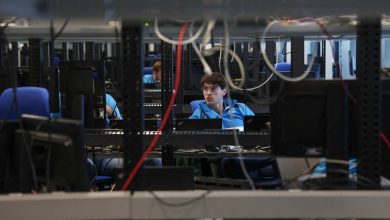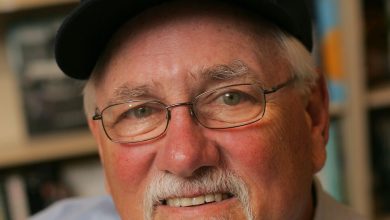Max Verstappen Wins Formula One Title, Passing Lewis Hamilton on Last Lap

Max Verstappen won his first Formula One championship in stunning fashion on Sunday, passing his title rival Lewis Hamilton on the final lap of the season after a hotly debated decision by race officials to restart the race following a late crash.
The finish capped a stunning day of high-stakes racing, and ended a final-day duel for the world title in which Hamilton had led most of the race.
“It’s just insane,” Verstappen said, adding, “When you stand here and they tell you you’re the world champion, it’s just incredible.”
The decision by race officials to restart racing for one final lap after a late crash appeared to hand Hamilton the title may be remembered as long as Verstappen’s late dash to the checkered flag. Verstappen had recently made a pit stop for new tires, a last-gap attempt to catch Hamilton.
But after initially signaling the race would creep to its finish, race officials cleared the slower cars from between Hamilton, in the lead, and Verstappen, in second. Verstappen and his Red Bull team, could not believe its good fortune; Hamilton, and Mercedes, were crushed.
But it did not take long for Verstappen to seize on his opening, and he soon passed Hamilton for the lead. Hamilton, who had been hoping to claim his record eighth world title, breaking a tie with Michael Schumacher, simply did not have enough time to grab the lead back.
The Abu Dhabi Grand Prix ended a unique Formula 1 season. While the pandemic forced the cancellation of many longtime races, the sport scrambled to add new ones. When the checkered flag goes down on Sunday, this will have ended up being Formula 1’s longest season.
Events planned in China, Canada, Singapore, Japan and Australia were canceled, but races were added in Portugal, Turkey and Qatar, which hosted its first Grand Prix in November.
“We were able to bring home a calendar that will take us to 22 races this year, showing how strong the system is and how good the relationships are that we have around the world,” said Stefano Domenicali, the chief executive of Formula 1.
The record calendar, up from 21 races in 2019, was positive news for Formula 1 as it tried to recover from the impact of Covid-19. Revenue jumped, rising 12 percent in the third quarter, compared with the same period last year, but the longer season has also taken a toll on teams. The Haas team said workers had quit because of the added workload and constant travel.
Günther Steiner, team principal of Haas, said a handful of his staff members were leaving to find jobs outside Formula 1, partly because of the growing calendar.
“A few people just don’t want to do the 23-race schedule next year,” he said.
“One [engineer] just started a family, and he’s leaving. In general, I would say we have got a little bit more turnover than the years before, but not a lot.”
It is not about to get easier. The calendar will grow again in 2022 because of the addition of the Miami Grand Prix. Twenty-three races are scheduled from March 20 to Nov. 20. About a month has been cut from the season to avoid a clash with the FIFA World Cup. To accommodate that compressed schedule, races will be held on back-to back Sundays 11 times, up from eight this season, giving teams less time to rest. Twice there will be events on three straight weekends.
Andreas Seidl, team principal of McLaren, said holding more races in a shorter season would “make it even more intense between the first and the last race.”
“But it is positive seeing how big the interest is in the different countries,” he said. “We as a team are highly interested in the commercial growth of Formula 1.”
Still, senior officials are conscious of the schedule’s cost to team personnel, including the drivers.
Lando Norris of McLaren said it was becoming “harder” to find time to rest and recover between races as more Grands Prix are added. He called the amount of travel “one of the toughest things.”
“It does take a toll on you,” he said. “We’re directly at work less than the mechanics and the engineers. But our side of the job is a lot more physical, and it’s still mentally draining, how much you’ve got to focus, how much time and effort you put into thinking about all these things and trying to improve and so on.”
Sebastian Vettel of Aston Martin warned that Formula 1 “mustn’t neglect that we are a group of people and human beings traveling around the world.”
“If we have 52 weekends in a year, we do 23 of those as races and [there are] a couple of months in a year that we can’t hold races in most places around the world [because of the weather], it obviously gives you a very intense season,” he said.
“The objective should be [that] we have a sustainable way to run our season, not only for our environment, but also looking at the human resource.”
Teams are taking steps to ease the burden. Many allow people to miss some races to stay fresher over the season. Some teams offer financial incentives for working more races and book more comfortable hotels at the end of a long trip.
The expansion may also not stop at 23 races. Qatar and China have contracts to each host a race starting in 2023, which would create a 25-race schedule, the limit under Formula 1’s regulations.
Franz Tost, the team principal of AlphaTauri, feared that the saturation of races could also be too much for fans.
“I think Formula 1 will lose a little bit [of] the premium market, because if every weekend there is a race, people will lose interest,” he said.
“This is what worries me more: not because of the workload, it’s because people get overloaded with races.”
Frédéric Vasseur, the team principal of Alfa Romeo, said a potential 25-race calendar should be considered “a positive first, because it means that Formula 1 is doing well and perception of F1 is improving.”
“We have to take care that the fans won’t lose the motivation,” he said. “That is important. But for the team, I don’t think it will be a mega issue.”
Kimi Raikkonen of Alfa Romeo will retire from Formula 1 this weekend, ending a 20-year career. When he made his debut in 2001, the calendar had only 17 races, the majority of which were in Europe. He did not finish Sunday’s race.
Raikkonen, 42, said the growing calendar was not a factor in his decision to retire. But he did urge caution over the impact it would have on those working in Formula 1.
“They are doing long days, especially if there are issues with the cars,” he said. At the race in Mexico, he said, “they worked overnight. It’s hard for them.”
“The problem will burn out a lot of people,” Raikkonen said, “and it’s not going to be good for anybody.”



